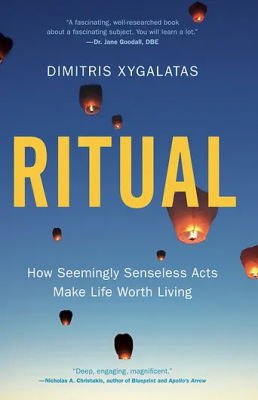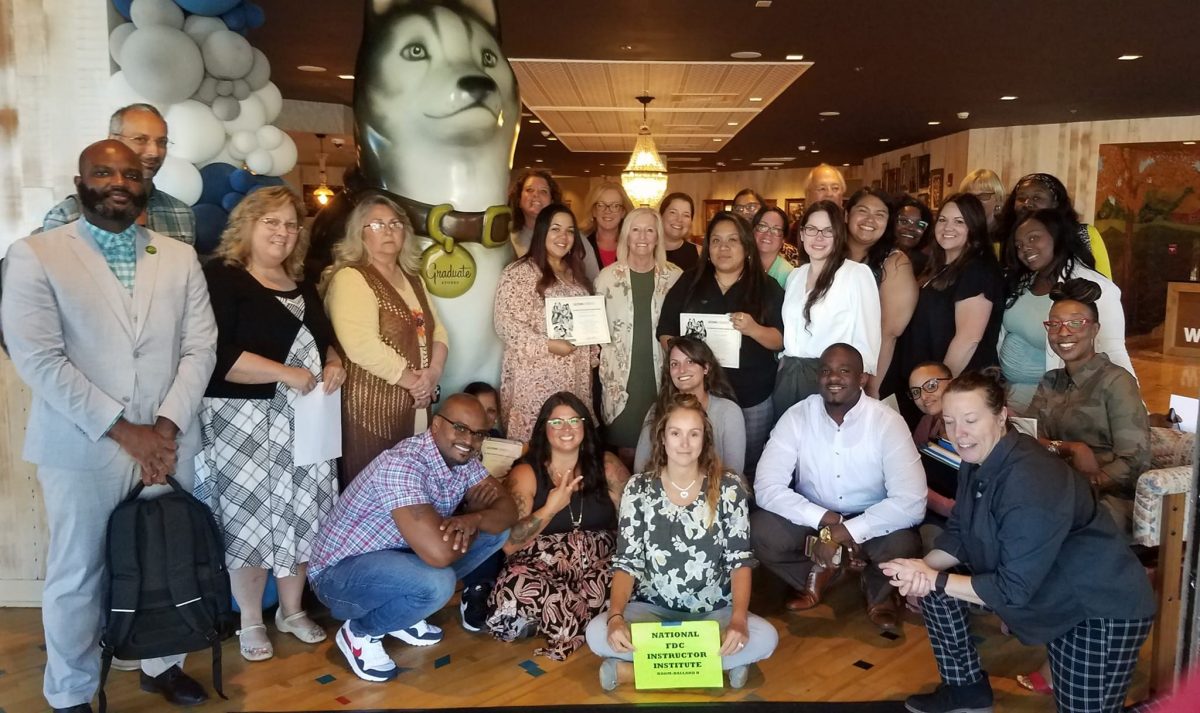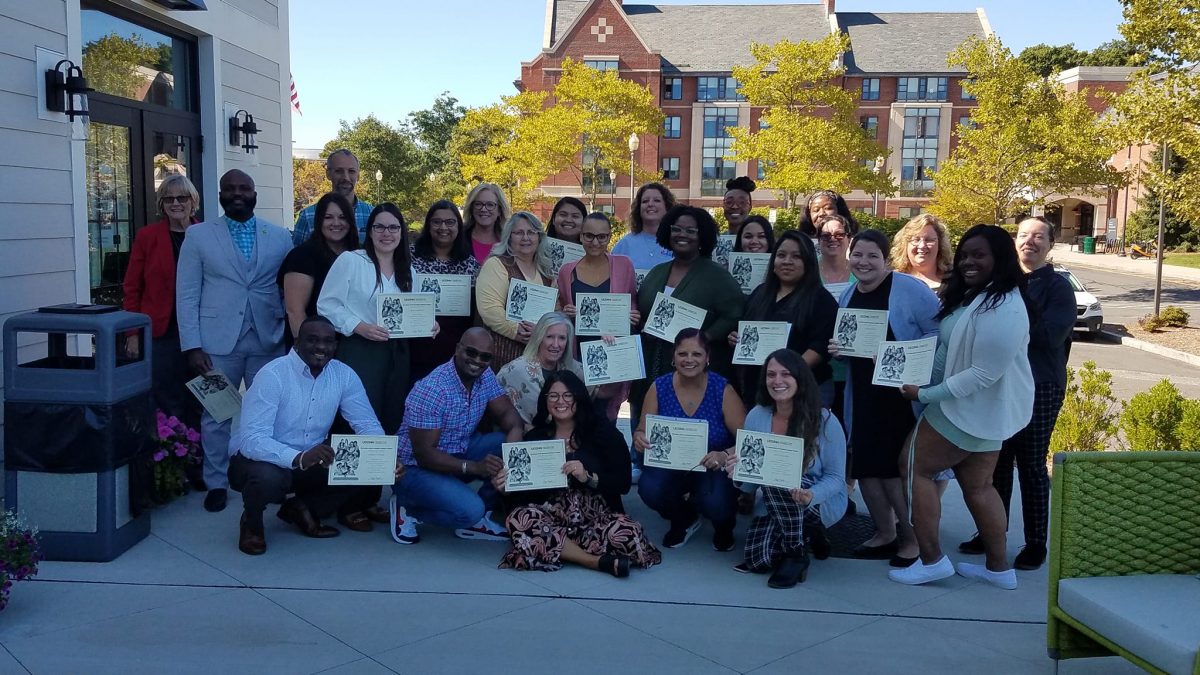21 new FDC® instructors from family service agencies around the country are now certified to teach the 90-hour “Empowerment Skills for Family Workers” course. Scroll through this brief slideshow to learn more.
21 new FDC® instructors from family service agencies around the country are now certified to teach the 90-hour “Empowerment Skills for Family Workers” course. Scroll through this brief slideshow to learn more.
A recent article in UConn Today features the virtual study exchange program initiated by the CHHD with Radboud University in the Netherlands. Professor Sara Harkness is quoted describing the experience, “That’s the epitome of a wonderful class – when you have gathered, in one group, people who bring different life experiences and cultural backgrounds to share with each other and learn from each other.”
Read more about it here.
UConn undergraduate students will have the opportunity to enroll in a new interdisciplinary minor in Culture, Health, and Human Development (CHHD), beginning in Fall 2023. The new minor includes 54 designated classes offered by 17 departments in three of UConn’s schools and colleges, and is open to students majoring in any program. The CHHD minor will require completion of five classes distributed among the three clusters of Culture, Health, and Human Development. Students are encouraged to consult about their choice of courses with their home department academic advisors. The intent of the new CHHD minor is to foster an integrative cultural perspective on human development and health, including issues related to diversity both within and across populations.
According to the UConn Undergraduate Catalogue, the CHHD minor “can address gaps between the traditional disciplines … by providing students an opportunity to explore systematic relationships among culture, health, and human development.” Derek Houston, Department Head of Speech, Language, and Hearing Sciences, points to the importance of culture in human communication, and says the CHHD minor “will set aspiring speech-language pathologists and audiologists on a path toward embracing cultural diversity in their future practices.”
The new minor is the product of collaboration between the Center for the Study of Culture, Health, and Human Development, and faculty, department heads, and deans from the College of Liberal Arts and Sciences, the College of Agriculture, Health, and Natural Resources, and the College of Nursing. Professor Charles Super, co-director of the CHHD, led the effort to create this educational opportunity for undergraduates. The CHHD has offered an interdisciplinary Graduate Certificate since its establishment in 1998.
You can learn more about the minor and its requirements here: chhd.uconn.edu/chhd-minor/ .
Dimitris Xygalatas, Associate Professor of Anthropology and Psychological Sciences at the University of Connecticut, recently published his new book titled “Ritual : How Seemingly Senseless Acts Make Life Worth Living”.
Brief description:
Ritual is rooted deep in our evolutionary history – and for good reason. Although ritual actions have no direct influence on the physical world, they can transform our inner world and play a decisive role in shaping our social reality. This book is a journey through the latest research on ritual, which reveals the its workings and the important functions it serves for individuals and their communities.
You can learn more about the book here: https://www.xygalatas.com/copy-of-books.
Here’s a link to an interview with Dr. Xygalatas about the book on NPR.

A presentation by Charles Super is highlighted in a recent report by the U. S. National Academy of Sciences on International Perspectives in U.S. Psychological Science Journals. Prof Super “discussed why globalization of the profession and cultural considerations underlie the importance of international perspectives. He posed a question to the group, especially to journal editors and others who serve as gatekeepers: “Can we remain at the center of global psychology if we don’t let others in?” Super further pointed out that “most psychological constructs remain based on Euro-American folk theories, and ideas of development are rooted in Euro-American culture. How do we go from ethnoscience to global science?” Training students in the way things have always been done no longer suffices.” The full report can be found here.


César Abadía-Barrero is part of the Fulbright U.S. Scholar Program for the following project:
Understanding peace building through Buen Vivir in Caquetá, Colombia
My ethnographic and community-based collaborative research seeks to investigate how an
intercultural community of displaced peasants and indigenous peoples in Caquetá is building
peace through the incorporation of the principle of Buen Vivir. Roughly translated into English
as “good living,” “good life,” or “living beautifully,” Buen Vivir is an indigenous cosmology and
epistemology of the Andean region, most prominent in Ecuador and Bolivia. It can be described
as a way of life that prioritizes interconnectedness among humans, non-humans, and the rest of
the natural world. Significantly, Buen Vivir entered the realm of peace building in Colombia
through the 2016 peace accord between the national government and FARC-EP, where it appears
as a guiding principle for the design and implementation of the comprehensive rural reform
provision. Given the radical potential for transformation that Buen Vivir represents, its inclusion
in the Colombian peace accord is notable.
My Fulbright research project aims to shed light on whether indigenous epistemologies such
as Buen Vivir can contribute not only to peace building in Colombia but to confronting
environmental degradation. Increasingly, societies will benefit from understanding the efforts to
repair relationships among humans and between humans and nature. This project, grounded in
anthropology but largely interdisciplinary, aims to contribute to this line of scientific and
political enquiry.
The project is taking place in Caquetá. This departamento (equivalent to state in the U.S.) is
located in Colombia’s southwest. Because of its geographic location, spanning Andean
mountains and Amazonian plains, Caquetá was one of the epicenters of the country’s armed
conflict, with 75% of its population being victims. However, Caquetá’s ecosystems and
community resilience represent a unique opportunity to explore how humans and nature can heal,
and whether the guiding principle of Buen Vivir can transform Colombian society towards
peaceful relationships.
My project contributes to these emerging debates around people’s relationships with nature,
sense of good living, and territorial belonging within the context of post-peace accord settings
and alarming rates of environmental degradation. In particular, it asks: how do inter-cultural and
diverse communities negotiate new meanings about their territories and design actions that align
with their ideals of what they want their territories to become? How do their actions confront the
legacies of violence against humans and against nature?
Maria LaRusso is part of the Fulbright U.S. Scholar Program for the following project:
Children’s Rights to Healthy Development: Piloting a Social Justice and Youth Well-being Program in Colombia
Recent scholarship in children’s rights has highlighted the value of expanding the focus on
survival to a broader understanding of well-being, including the use of positive indicators of youth
flourishing or thriving in assessments of progress. However, a 2020 report created by a commission
of the World Health Organization (WHO), the United Nations Children’s Fund (UNICEF) and the
Lancet found that not a single country performed well on a newly developed child flourishing index.
This project aims to promote adolescent well-being through both self-care and social action,
bridging mindfulness-based stress reduction practices with activities that cultivate critical
consciousness to raise awareness of the ways in which social and economic conditions, ecological
and agricultural changes, and unregulated industries violate children’s rights to healthy development.
There is an abundance of programs designed to reduce risk behaviors and promote well-being for
adolescents, but the limited success of most programs is a testament to how hard it can be to
“motivate” youth to change behaviors or habits to healthier ones. This program, Well-being And
Consciousness for Teens (We-ACT), takes a new approach by harnessing adolescents’ bourgeoning
critical thinking skills and concern for fairness and justice to inspire them to take action and
advocate for their own well-being. Colombia presents a unique opportunity to pilot this program
given the complex array of factors affecting youth well-being and the clear youth-based activism and
demands for justice, rights and participation that Colombia has experienced in recent years. To
conduct this work, I am partnering with the Pediatrics Department at Universidad Nacional, and a
community organization in Colombia that developed an evidence-based mindfulness and meditation
program that aims to foster self-awareness and life skills for adolescents.
Read the article from UConn Today:
Jean Lau Chin Award – Two Outstanding UConn Psychologists Tackle International Leadership